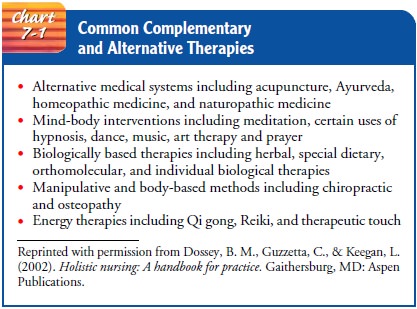Chapter: Medical Surgical Nursing: Individual and Family Considerations Related to Illness
Holistic Approach to Health and Health Care
Holistic Approach to Health and
Health Care
Since the 1980s,
holistic therapies have more frequently accompanied traditional health care. A
survey on the use of holistic health practices reported that about 34% of the
1539 respondents in a national random sample of adults older than 18 yearsof
age (732 women and 807 men) had consulted with at least one holistic health
care practitioner within the past year. The studyfurther noted that although
many of the people were also seeing a traditional health care provider, 72% did
not inform the physician that they were obtaining holistic treatment
(Eisenberg, et al.,1993). Several additional research studies (Sparber, et al.,
2000; Wynia, Eisenberg, & Wilson, 1999) support the original work of
Eisenberg’s group indicating that adult clients, even clients participating in
clinical research trials, frequently use complementary therapies to assist them
in coping with their illnesses an treatments. The need to discuss the use of
these adjunct therapies with clients in all settings is imperative. During
their clinical assessments, nurses must obtain information about the client’s
use of complementary therapies. Some of the most commonly used complementary
therapies are listed in Chart 7-1.

For some people, the
holistic approach is viewed as a way to capitalize on personal strengths and
recultivate the values and beliefs about health that were common before the age
of technological innovations and the sophistication of biomedical science. A
lack of focus on the individual patient, the family, and the environment by
some health care providers has created feelings of disillusionment and
depersonalization in many patients. The cost of illness, especially chronic
illness care, continues to escalate and accounts for an increasing percentage
of health care dollars. At the same time, patient satisfaction with the health
care received has decreased.
Active participation of
the patient and family in promoting health supports the self-care model
historically embraced by the nursing profession. This model is congruent with
the philosophy that seeks to balance and integrate the use of crisis medicine
and advanced technology with the influence of the mind and spirit on healing. A
holistic approach to health reconnects the traditionally separate approaches to
mind and body. Factors such as the physical environment, economic conditions,
sociocultural issues, emotional state, interpersonal relationships, and support
systems can work together or alone to influence health. The connections among
physical health, emotional health, and spiritual well-being must be understood
and considered when providing health care. It is the nurse’s conceptual
integration of the physiologic health condition with the emotional and social context,
along with the tasks and developments of the patient’s life stage, that allows
for the development of a holistic plan of nursing care.
Related Topics